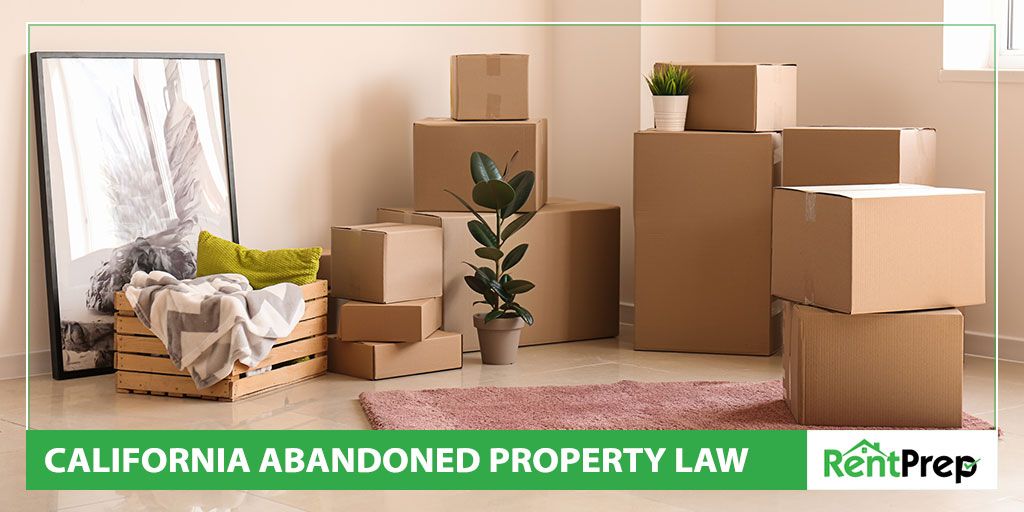
Being a landlord in California involves more than just managing properties; understanding the state’s abandoned property law is crucial. This law dictates how landlords must handle personal belongings left behind by tenants. Failure to comply can lead to legal complications and financial penalties.
Key Takeaways:
– California law requires landlords to follow specific procedures for handling abandoned property.
– Abandoned property must not be disposed of immediately; it requires proper inventory, storage, and legal notices.
– After 18 days of notice without response, landlords can sell or dispose of items.
– Items valued over $700 must be auctioned; proceeds go to the county after deducting costs.
– Landlords must document all actions and consider lease terms and tenant communication.
Most new landlords think that the most stressful part of their job will be dealing with trying eviction cases. In reality, however, other challenging issues may be even more frustrating. One example is abandoned property, and all landlords should be familiar with California’s abandoned property law if they’re renting housing in the state.
Abandoned property or belongings left behind by former or evicted tenants cannot be simply tossed out as some landlords might hope.
Instead, landlords must follow a particular process and holding period, or you could face legal trouble. With the proper knowledge, landlords could avoid huge fees, or even court cases filed against them for doing what they feel is simply taking out the trash.
When is property considered abandoned in California, and what should landlords do to ensure they handle these personal belongings properly? Today, learn all you need to know about this from the RentPrep guide to California abandoned property law.
A Table Of Contents On California Abandoned Property Law
Like many laws, those that dictate abandoned property vary by state. As a landlord working in California, it’s vital to learn the state’s specific rules on what to do with items left behind by a tenant. Simply discarding these belongings isn’t always an option. Here’s what you can do:
- What Is Abandoned Property?
- California Abandoned Property Law Explained
- Step By Step: What To Do When Property Is Abandoned
- Preventative Tips: Avoiding Abandoned Property
- Abandoned Property Law In California: FAQs
- How does abandoned property get claimed in California?
- When is personal property considered abandoned in California?
- Can a landlord throw out personal belongings in California?
- How much can a landlord charge for cleaning in California?
- How long does a landlord have to store tenants’ belongings in California?
- What Happens if a Roommate Abandons Property in California?
- Is Abandoned Property the Same as Adverse Possession?
- Abandoned Property: When You Can Finally Let It Go
What Is Abandoned Property?

The first thing landlords need to understand to handle this process is the definition of abandoned property. What exactly is abandoned property, and why do landlords need to know how to handle it properly?
When a tenant leaves a rental property due to eviction, abandonment, or the usual end of a lease period, any belongings left behind are known as abandoned property. These belongings are still the tenant’s personal property but have been left at your property.
Abandoned property is complicated because you cannot immediately dispose of the items. Instead, local and state laws dictate how you must store and dispose of these items to ensure that their rightful owner, the former tenant, has a chance to retrieve them if they wish to do so.
California Abandoned Property Law Explained
In California, belongings left behind in a unit after the lease has been terminated are considered abandoned. While you can remove things like rotting food or garbage, you must inventory and store all other property until you contact the tenant.
Under California law, a tenant has the right to leave their belongings on your property for a maximum period of 18 days following the issuance of a notice of abandonment. During this time, the tenant can reclaim their items. If there is no response from the tenant within this 18-day window, landlords are legally permitted to proceed with the removal, sale, or disposal of the belongings left on the property.
The landlord can claim any items worth less than $700. Items worth more than $700 must be sold at auction, and the proceeds will go to the county where the property is located. Landlords can, however, deduct reasonable costs they paid for storage and management of these sales.
Step By Step: What To Do When Property Is Abandoned
Handling this situation can be trying. Set yourself up with a step-by-step guide so that you know exactly what to do with abandoned property in California.
Step 1: Consider Why The Tenant Left
Based on that information, confirm why the tenant left the property and what you need to do. You can move forward if the lease is over, and that is why they left. You can also move forward if you ended the lease early and they followed those terms. In other situations, such as eviction or the tenant simply leaving, you must ensure the lease is over before moving forward.
Step 2: Review The Lease
Does your lease include any terms about abandoned property?
If so, review this information to remember what you and the tenant agreed. Local laws will still take precedence over the lease terms, but you want to be sure that you are doing what you and the tenant initially decided to do.
If you don’t have any clauses in your lease about abandoned property, it might be a great time to add this to your rental lease template. Clarify what will happen if the tenant abandons property, who is responsible for storage and disposal costs, and how to claim abandoned property in California. This way, everyone is on the same page.
Step 3: Send Legal Notice
Now it’s time to send the former tenant notice of what was abandoned, where it’s being held, what will happen to it, and when.
When drafting a ‘Notice to Remove Personal Property from Premises’ in California, landlords must ensure it includes key details like the identification of abandoned items, the storage location, deadlines for retrieval, and potential costs involved. This notice serves as a formal communication to the tenant, outlining their rights and responsibilities regarding the abandoned property.
It’s crucial for landlords to send this notice promptly and directly to the tenant, ensuring it aligns with California’s legal requirements for property abandonment, so be sure to send out this notice of abandoned property in California as soon and as directly as possible. Additionally, it’s a good idea to post the notice on the door if the tenant returns to the property.
Make sure to include the following:
- List of inventoried items
- Where the items will be held
- What needs to happen for the items to be retrieved
- What it will cost the tenant for the storage of the items
- What will happen if the tenants are not retrieved
Giving all of this information will ensure that you have legally protected yourself and that the tenant is fully informed about the abandoned property process. We recently teamed up with RocketLawyer to offer landlords a resource for free legal advice. Get your landlord advice here.
Step 4: Remove The Items
Once the notice period passes, you are free to remove the items. In California, you can keep items that cost less than $700 to resell or dispose of at will. You must sell more expensive items at auction, and the profits will go to the county. These sales can easily be set up with a local bond agency, and the cost of doing so should be deducted from the sale proceeds.
Exceptions
You should not dispose of or sell motor vehicles and permanent fixtures. Report motor vehicles to the local police as abandoned; they will handle things from there. Permanent fixtures installed at the property are yours to keep and do not need to be reported, as they are now part of the rental property.
Preventative Tips: Avoiding Abandoned Property
As a landlord, it’s essential to have a backup plan just in case your tenant decides to leave your rental property without notice.
#1: Document Everything
One of the most important things you should remember to do throughout this process is document everything. Photograph the belongings as they are found, stored, and otherwise handled. Additionally, be sure to keep copies of every notice and form that you utilize to ensure that you can prove you followed the appropriate steps when handling the belongings.
#2: Confirm The Property Is Abandoned

If you’re dealing with property left behind after a tenant moved out and their lease ended, you should consider the property abandoned. However, it’s not always clear if the tenant has genuinely left, and you must consider this.
Sometimes, tenants will leave a property without notice. When this happens, you need to follow up with as many resources, such as emergency contacts, as possible to confirm that the property is abandoned before you start handling it as such.
For example, a tenant who suddenly goes on a prolonged vacation or goes to jail is still technically a tenant as long as they did not break the lease terms. Make sure to take no action on personal belongings until you have confirmed the property is abandoned and the lease has ended.
#3: It All Starts With Screening
While tenants who were great while living at the property may abandon their belongings without cleaning up, this situation is less likely to occur when you have great tenants in your rental units. The only way to ensure you end up with the right tenants is to ensure you have the correct screening practices.
Tenant screening can be complicated, but the process is easily simplified by utilizing third-party assistance like RentPrep’s tenant screening packages. These extensive packages offer a variety of options to landlords like you. Ensure you have the best tenants possible by thoroughly screening for any tenant you bring on.
Abandoned Property Law In California: FAQs
Let’s take a look at some of the most frequently asked questions regarding the abandoned property laws in California.
How Does Abandoned Property Get Claimed In California?
In California, former tenants have 18 days to claim abandoned property after receiving notice from the landlord. After that time, there is no guarantee that they will be able to get their belongings back. The best thing tenants can do when they realize they want to claim their belongings is to contact the landlord and set up a plan ASAP.
What Is Considered Abandoned Property In California, And How Should Landlords Handle It?
In California, personal property is considered abandoned after the landlord sends an official notice and 18 days have passed. Landlords must inventory these items, notify the tenant, and store them securely.
If the tenant does not respond to the notice within 18 days, the landlord can proceed to legally remove, sell, or dispose of the belongings, with specific guidelines for items valued over $700. Until then, the property should not be handled or disposed of other than to store the property in a safe, secure location.
If a tenant leaves the property without notice, this period may be longer because a formal eviction process to end the lease should occur first. The official 18-day notice period can begin once the lease is considered negated.
Can A Landlord Throw Out Personal Belongings In California?
Landlords can only throw out personal belongings in California once the proper abandoned property proceedings have been followed. First, the landlord must notify the tenant and give them 18 days to respond to that notice. If that 18-day period passes without a response, the landlord can dispose of the items.
However, the value of the items will also play a part in what happens next. The landlord can keep, dispose of, or sell items under $700.
Items valued above that amount must be auctioned, and most of the proceeds should go to the state or county. The landlord can keep enough profits to cover the storage, organization, marketing, and cleaning of abandoned belongings.
How Much Can A Landlord Charge For Cleaning In California?
The cost of cleaning must be reasonable and appropriate for the unit. Some rental units can be professionally cleaned for around $200; others will cost more. Landlords should always keep their detailed receipts when deducting cleaning expenses from security deposits to prove the cleaning costs to be reasonable and necessary.
How Long Does A Landlord Have To Store Tenants’ Belongings In California?
After a lease has ended, landlords must send notice and store tenants’ belongings for 18 days while waiting to hear from the tenant. If the tenant doesn’t respond within 18 days, landlords in California can begin selling or disposing of the items.
What Happens if a Roommate Abandons Property in California?
In situations where a roommate in California abandons property, landlords must handle it with specific care. The process for roommates’ abandoned property is similar to standard property abandonment laws in California. Landlords should send a notice of abandonment to the roommate and offer an 18-day period for them to reclaim their belongings. If the roommate fails to respond or retrieve their items within this timeframe, landlords have the authority to decide the fate of the abandoned items in compliance with state law.
Is Abandoned Property the Same as Adverse Possession?
It’s important to differentiate between abandoned property and adverse possession in California. Adverse possession is a legal concept where someone may acquire legal ownership of a property under certain conditions over a period of time. This is distinctly different from abandoned property laws, which deal with handling personal belongings left by a tenant. Adverse possession involves a set of specific legal criteria and processes and should not be confused with the standard procedures for dealing with abandoned tenant property.
Abandoned Property: When You Can Finally Let It Go
Working as a landlord comes with many challenges, and part of the path to success is setting up systems to overcome them. Now that you know more about what to do when tenant belongings are left behind, you’re ready to create a plan that you can apply whenever faced with this situation.
Remember, the following is key when working within the binds of California abandoned property law:
- Do not immediately dispose of items that tenants leave behind.
- Make sure to contact tenants directly.
- If tenants give you permission to dispose of items, make sure to have this in your records.
- Store tenants’ belongings for the required amount of time before disposing of them.
- Sell any valuable items to pay back rent; all other funds may need to be returned to the tenant.
- Don’t forget to keep some of the funds to pay for storage costs and associated fees for handling the abandoned goods.
Once you become familiar with California’s personal property abandonment laws, it becomes easier. All that it takes is the prerequisite information to have you prepared, and you’ll be moving through these situations with ease.

